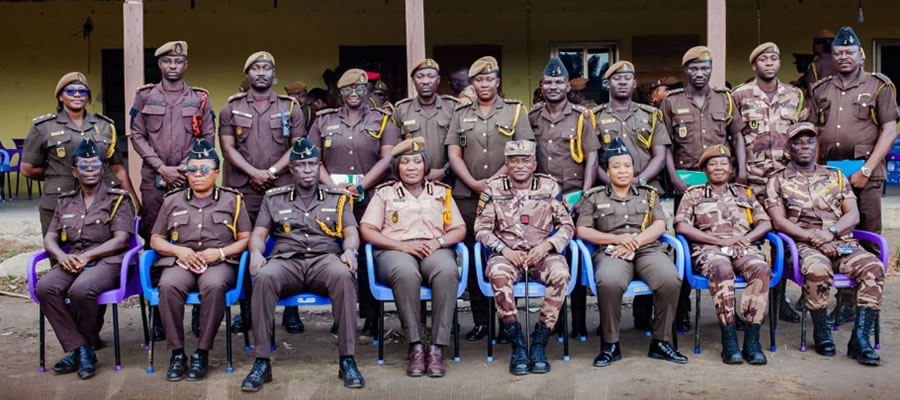

AREA COUNCILS
The Adansi Asokwa District has 4 Area Councils. They are:
All the Area Councils have permanent Area Council buildings. Asokwa Area Council structure is also occupied by the District Agricultural Department due to inadequate office accommodation.
All the area councils have clerk of councils that are manning them. However, the other staff who are supposed to support the clerk of councils are not in place. This is because they are paid from revenue items that have been ceded to them. Thus most of them who are qualified to do the job are not attracted enough. At best, they are taken on for two to three months and they tender in their resignation for better job. For personnel to be attracted to the job, the central government should take up their salaries. Besides, the personnel problem, the councils do not have the necessary logistics to work with. For instance, at this computer age, almost all the area councils are without computers. None of them has any means of transport and telephone facilities.
TRADITIONAL AUTHORITY
The whole district falls in the Adansi Traditional Area with their headquarters as the District capital, Fomena. Adansihene is the final traditional authority on the land. Under him are the various divisional chiefs and sub-chiefs. The chiefs adjudicate on family disputes and also mobilize the citizenry for communal labour.
ACCOUNTABILITY
The District Chief Executive is the Administrative and Political head of the Assembly and he is accountable to the General Assembly, the Regional Minister, the Minister of Local Government, Rural Development and to the President of the Republic of Ghana.
The D.C.E. is supposed to sign performance agreement periodically with the Regional Minister. He is also accountable to the General Assembly by the delivery of sessional address. The sessional address is discussed thoroughly by the General Assembly before consideration and acceptance.
The D.C.E meets the citizenry periodically to defend the policies and initiatives of the Assembly through questions and answers during the Town Hall meeting.
The D.C.E is under the scrutiny of the media daily on his decisions and utterances.
The Internal Auditor of the District Assembly and external Auditors are always scrutinizing the final performances of the District Assembly and the financial culpability of the D.C.E.
The D.C.E is responsible to the communities by accepting their invitation to ceremonies, durbars and inaugurations.
The District Coordinating Director on the other hand is the head of the bureaucracy in the district. He is in charge of the day to day administration of the Assembly and he coordinates all departments and sees to their effective performance.
He is responsible to the Regional Coordinating Director, the Regional Minister, the Minister of Local Government, Rural Development and Environment and the Head of Civil Service through the submission of quarterly reports, situation reports and any other assignment given for response.
Finally, the D.C.E and the D.C.D are under the eagle eye of the Finance and Administration sub-committee for effective financial and administration performance in the district.
PARTICIPATION OF THE CITIZENRY
COMMUNITIES
The communities operate around the Unit committees through to the Assembly members, the Area Councils to the District Assembly.
The chiefs are also a major rallying force within the communities and there is the need for collaboration between these institutions for effective mobilization of the citizenry for communal work. It is noted that areas in the District where there is absence of such collaboration between the unit committees and the chiefs always brings about apathy and total breakdown of communal cooperation.
COMMUNITY BASED ORGANIZATIONS (CBOS)
Community Based Organizations abound in the district with the majority formed around HIV/AIDS but they are not well structured and formally organized. The other CBOS are formed around Farmers’ Associations, Hair Dressers’ and Dress Makers’ Associations.
BUSH FIRE
Bush fires caused by individuals have been on the low side. This would be attributed to the intensive educational campaign mounted by NADMO in conjunction with the National Fire Service and Agricultural Extension Agents. Communities are always advised to grow green belts to protect their settlements.
DISASTER MANAGEMENT
Management of disasters in the district is very effective. They are managed based on the kind of disaster that occurs at a particular location. The disasters which normally occur in the district include domestic/bushfire outbreaks, rainstorms,epidemics and so on.
When communities in the district are hit by rainstorms, the District Directorate of NADMO liaises with the District Assembly, the Regional Directorate of NADMO and the National Headquarters of NADMO for a befitting relief package to be sent to the affected community
If there is a fire outbreak, both domestic and bushfires alike, the District Directorate of NADMO in collaboration with the outfit of the District Fire Service and the District Directorate of MOFA to bring all fire outbreaks under control, after which the necessary relief packages are given to the victims.
If an epidemic breaks out, the District Directorate of NADMO liaises with the District Directorate of Health Services to bring the situation under control.
PRIVATE SECTOR INSTITUTIONS
Adansi Asokwa District is predominantly an agricultural economy. However, private farmland holdings are relatively small in size and the average farm holding size is below 1 hectare. At best there are only pockets of farmers who could be described as medium scale farmers. Small-scale commercial farm owners dominate the private sector.
There exist private purchasing companies whose operations are of immense importance to farmers and the economy in general. The following private purchasing companies exist in the district. Kuapa, Fedco, Adwumapa, Produce Buying Company, etc. Other Private sector Institutions are millers (rice, maize, cassava, palm oil) timber merchants, processors and a medium scale wooden processing industry.
The predominance of agriculture in the district and the high output in agricultural raw materials, make the district a potential force to reckon with in the establishment of processing industries. Thus, the One District, One Factory (1D1F) initiative of government would thrive well in the area of oil palm processing in the District. It is also a potential for the majority of the youth to be trained in non-traditional agricultural production. The Assembly has taken the lead and has started gradually in the training of the youth in snail rearing, bee-keeping and mushroom production.
The District has a rural bank, Adansi Rural Bank Ltd and Bosome Freho. Contractors, the garages, welders, plumbers, dressmakers, hair dressers, carpenters and masons are the main nucleus of substantial employment for our stream of J.S.S. and S.S.S students that come yearly.
In view of the effect of poverty on the socio-economic development of the District, the Assembly is implementing pro-poor programmes to mitigate the impact of poverty. The Assembly is currently embarking on the Youth Employment Programme to provide employable skills and jobs to the youth. In the District under the programme, certain modules have been selected by the Assembly during the previous plan period (2014-2017) to train the youth in these modules and after that offer them jobs. In 2018, Government of Ghana has introduced the Nation Builders Corp (NABCO) as part of efforts to reduce unemployment through job creation. The initiative has the following modules that would employ the teeming unemployed graduates in Ghana:
• Heal Ghana
• Clean Ghana
• Civic Ghana
• Educate Ghana
• Revenue Ghana
The Heal Ghana module seeks to employ unemployed graduate Nurses in the Health sector; the Clean Ghana module seeks to employ Graduates in the Environmental sector; the Civic Ghana module aslo seeks to employ Graduates in the Local Government Service to enhance local governance; Educate Ghana Module would employ teachers into the Ghana Education Service and Revenue Ghana would employ graduates to help in revenue generation. The programme according to Government of Ghana would last for three (3) years by which Graduates would be equipped with requisite technical know-how and tools for nation building and would be considered for permanent employment in the public sector.
The project aims at training the youth to acquire the necessary skills and after that integrate them into mainstream professions selected. The purpose of the programme is to provide additional employment opportunities for the youth for their economic empowerment. Micro-credit facilities by the government would be accessed in the District to reduce poverty. The Assembly also has an objective to reduce extreme hunger and poverty by working towards achieving the Sustainable Development Goals (SDGs) on poverty reduction on the proportion of people living on less than $1 a day and having malnutrition.
Date Created : 2/15/2019 2:18:25 AM








 facebook
facebook
 X
X
 Youtube
Youtube
 instagram
instagram
 +233 593 831 280
+233 593 831 280 0800 430 430
0800 430 430 GPS: GE-231-4383
GPS: GE-231-4383 info@ghanadistricts.com
info@ghanadistricts.com Box GP1044, Accra, Ghana
Box GP1044, Accra, Ghana